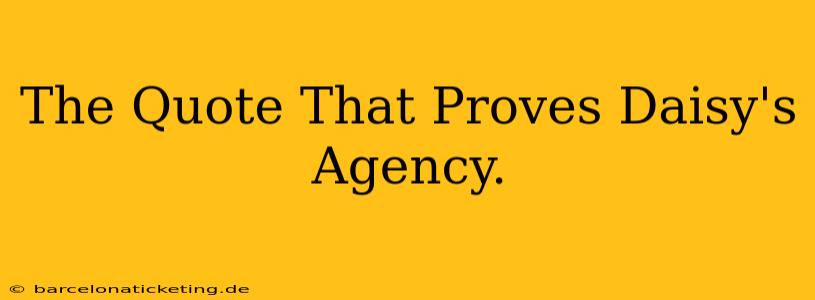The Quote That Proves Daisy's Agency: Re-examining a Complex Character in The Great Gatsby
F. Scott Fitzgerald's The Great Gatsby is a novel brimming with complex characters, none more debated than Daisy Buchanan. Often portrayed as a passive, fickle woman swept along by the currents of wealth and societal expectations, a closer look reveals a character with surprising agency, albeit subtly expressed. While many interpretations focus on her perceived weakness, a single, powerful quote illuminates Daisy's capacity for deliberate action and conscious choices, challenging the simplistic portrayal often assigned to her.
This crucial quote, and the agency it reveals, will be analyzed in the following sections. We’ll also delve into frequently asked questions surrounding Daisy’s character, providing a more nuanced understanding of this enigmatic figure.
What makes Daisy Buchanan so compelling to readers?
Daisy's enduring fascination stems from her inherent ambiguity. She embodies the allure and tragedy of the American Dream, caught between old money and new, innocence and corruption. Her beauty, charm, and social grace mask a deeper complexity that leaves readers grappling with her motivations and ultimately, her culpability. Is she a victim of circumstance, or a manipulator who actively shapes her own destiny? The answer, as we'll see, is far from straightforward.
Is Daisy a victim or a perpetrator in the novel?
This is arguably the central question surrounding Daisy's character. While she's undeniably shaped by a patriarchal society that limits her choices, reducing her to an object of male desire, she's also capable of decisive, even ruthless, actions. The "victim" narrative simplifies a more complex reality. She makes conscious choices that have devastating consequences, making her a perpetrator, at least to some extent. The extent of that culpability, however, remains open to interpretation.
"That's the best thing a girl can be in this world, a beautiful little fool."
This seemingly innocuous statement, uttered by Daisy herself, is the key to understanding her agency. It's not a declaration of helplessness; rather, it's a calculated performance. She recognizes the power of beauty and the societal advantages it affords a woman in her position. By embracing the role of the "beautiful little fool," she shields herself from criticism and responsibility, effectively manipulating the expectations placed upon her. This is a deliberate choice, a strategy for survival and self-preservation within a restrictive social framework. It's not passivity; it's a carefully constructed facade designed to protect her own interests.
This quote demonstrates a level of self-awareness and calculated manipulation often overlooked in simpler interpretations. It's a conscious decision to adopt a persona that shields her from judgment while allowing her to navigate the complexities of her life.
What are Daisy’s motivations in the novel?
Daisy's motivations are complex and multifaceted. They are rooted in her desire for security, love (or at least the illusion of love), and social status. Her marriage to Tom, despite its infidelity and unhappiness, provides her with a level of comfort and security she values highly. Gatsby's idealized love, on the other hand, offers the promise of a different life, but one potentially more precarious. This internal conflict is central to her character and explains many of her seemingly contradictory actions. She is pulled between two desires – the stability of her current life and the romantic idealism offered by Gatsby.
How does Daisy's agency impact the narrative of The Great Gatsby?
Daisy's agency, often overlooked, significantly alters our interpretation of the novel. It moves her from a passive object of desire to a complex character with her own motivations and capacity for decision-making. This reframing challenges the traditional understanding of the story, forcing readers to reconsider the roles of gender, social class, and responsibility within the narrative.
In conclusion, while Daisy Buchanan's actions may appear contradictory or even morally questionable, the quote, "That's the best thing a girl can be in this world, a beautiful little fool," reveals a degree of conscious self-preservation and manipulation. This highlights her agency, albeit often masked by societal expectations and her own calculated performance. Understanding this aspect of her character offers a more nuanced and ultimately, more compelling reading of The Great Gatsby.

